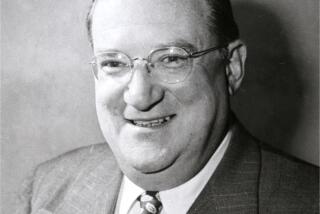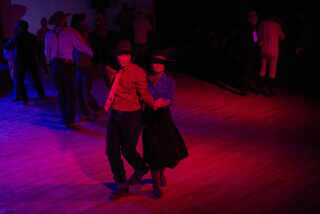Friends and Fans Recall an American Icon
- Share via
The children visiting the Autry Museum of Western Heritage in Griffith Park on Friday didn’t know much about cowboy legend Gene Autry, except that he had a swell museum.
But they sure knew “Rudolph the Red-Nosed Reindeer,” a song recorded by Autry in 1949 and still popular five decades later.
“I feel that he really hasn’t left us because he’s left such a terrific legacy,” said Alex Gordon, director of music licensing for Gene Autry Entertainment. Look at the numbers: 635 recordings, more than 90 feature films, 91 TV shows, and a $34-million museum that features everything Western from Remington artworks to the hat of Autry’s comic sidekick, Smiley Burnette.
The singing cowboy was mourned Friday by the famous and just plain fans at the museum he created; in Anaheim, where his baseball Angels played; in Palm Springs, where the Angels once trained and where he had a hotel; in Hollywood, where he is the only entertainer with five stars on the Walk of Fame.
“Gene Autry is the kind of hero that our culture simply doesn’t have anymore and hasn’t had for quite some time,” said Michael Stern, who with his wife, Jane, wrote the book “Way Out West,” a look at the Western in popular culture.
Film historian Leonard Maltin said, “If there hadn’t been a Gene Autry, there wouldn’t have been a Roy Rogers or any of the singing cowboys to follow. He really established the idea of a singing cowboy as a movie hero.”
Autry, who died at 91 in his Studio City home, was remembered and admired for the diversity of his life and his influence on the Southern California identity. He was an entertainer and an owner of radio and TV stations and of his beloved Angels baseball club.
Baseball Commissioner Bud Selig called Autry “one of the giants of the game.”
“Nobody could have loved the game more than Gene,” Selig said. “I know that people like Gene made incredibly meaningful contributions to the growth of the game, and they will never be forgotten.”
Carl Karcher, founder of Carl’s Jr. and a former member of the Angels’ advisory board, described Autry as “a great asset to the city of Anaheim.”
“He brought a lot of business into Orange County,” Karcher said. “It would be hard to estimate what that did for all the people here.”
“Gene was a master at everything that he turned to,” said A.C. Lyles, veteran Paramount producer and an Autry friend for 60 years. “One time at dinner, Gene said to me, ‘When I started, they said I couldn’t act. Other people said I couldn’t sing, but I sure as hell could count.’ ”
At the Autry Museum, officials and visitors said Autry would never be forgotten because his recordings and films continue to entertain new generations.
“He’s very much alive,” said Gordon, standing in front of a display with the singing cowboy’s favorite boots, his signature creased hat, his saddle and his Martin D-45 guitar. “Gene used to say that he’s like a baby-sitter for three generations of kids.”
Friends said Autry would most want to be remembered for his gift of the museum.
The museum today will open a special exhibit on Autry himself--something the humble cowboy discouraged during his life.
A public tribute to Autry also will be held on the museum’s south lawn at 1 p.m. Sunday.
Joanne Hale, the museum’s president and chief executive officer, said Autry “had a great love of the American West, was excited about the history. And it was always his dream to impart that information to children, so that they, too, would be excited.”
Johnny Mendez, a fourth-grade teacher from Los Angeles’ Allesandro Elementary School who brought his class to the museum Friday, said Autry’s legacy was to bring history lessons alive.
“We’re studying the Gold Rush,” Mendez said. Once the students saw the stagecoaches, they said, “Oh wow, look, here’s a stagecoach we saw in our social studies book. So it comes alive.”
One of his students, 10-year-old Johnny Martinez, also was impressed on his first visit to the museum. “You could see a lot of things that you never see in your life,” he said.
In Hollywood, honorary mayor Johnny Grant said that with Autry’s death, “baseball lost one of its most enthusiastic fans and America lost its favorite cowboy.”
Former baseball Commissioner Peter Ueberroth recalled meetings in which Autry would hold owners spellbound during discussions of potential expansion cities.
“He would take all the owners on a travelogue through each city,” Ueberroth said. “He had performed in each of those cities and gotten to know the people.
“A roomful of owners and their lawyers would sit there and watch him teach all about America. That’s the kind of love he had for the game.”
James Doti, president of Chapman University in Orange, described Autry as “a sweet man with great stories.”
Doti said he offered Chapman University as a meeting place for officials of the Angels and the Disney Co. during the often tense negotiations nearly two years ago over the sale of the baseball franchise. After the deal was set, he said, he and his wife were invited to watch an Angels game from the owner’s box.
As Autry and Doti talked, Doti said, Autry kept track of the game on a scorecard. At one point, he said, a batter hit a hard foul ball directly at the box. “It was coming right toward us,” Doti recalled. “Mr. Autry was focused on the box score and he didn’t see the ball coming our way. This all happens in an instant. It looked like it was coming toward him, so I pushed him down.”
The ball struck the front edge of a table, and Doti caught it on the rebound.
“Mr. Autry just said, ‘What happened?’ ” Doti said, adding that Autry later signed the ball for him with the inscription: “Thank you for saving my life.”
President Clinton said, “Gene Autry’s music and movies captured all that was good and inspiring about America’s Old West. His characters taught children across America important lessons about courage and freedom, justice and fair play.”
Gov. Pete Wilson said Autry was “not only one of California’s prized possessions, he was America’s favorite cowboy.”
Tributes also came from people throughout the country.
In Gene Autry, Okla., a town with a population of 92 that changed its name in honor of the man once billed as “Oklahoma’s Yodeling Cowboy,” the local radio station played an hour of Autry’s music Friday.
Autry’s death was also mourned in Palm Springs, where he maintained a residence, primarily so he could be close to his ball team during spring training there.
Rose Narva, who was hired to direct the Autry Hotel in Palm Springs and later co-owned it with Autry, recalled a Christmas party at the hotel three years ago at which Autry broke out in song.
“It was such a treat,” she said, “to hear him start humming, then to suddenly start singing his Rudolph song, and the whole room joined in.”
Times staff writers Jeff Gottlieb, Tom Gorman, Greg Hernandez, Brady MacDonald, Bill Shaikin and Katie E. Ismael contributed to this story.
More to Read
Go beyond the scoreboard
Get the latest on L.A.'s teams in the daily Sports Report newsletter.
You may occasionally receive promotional content from the Los Angeles Times.








